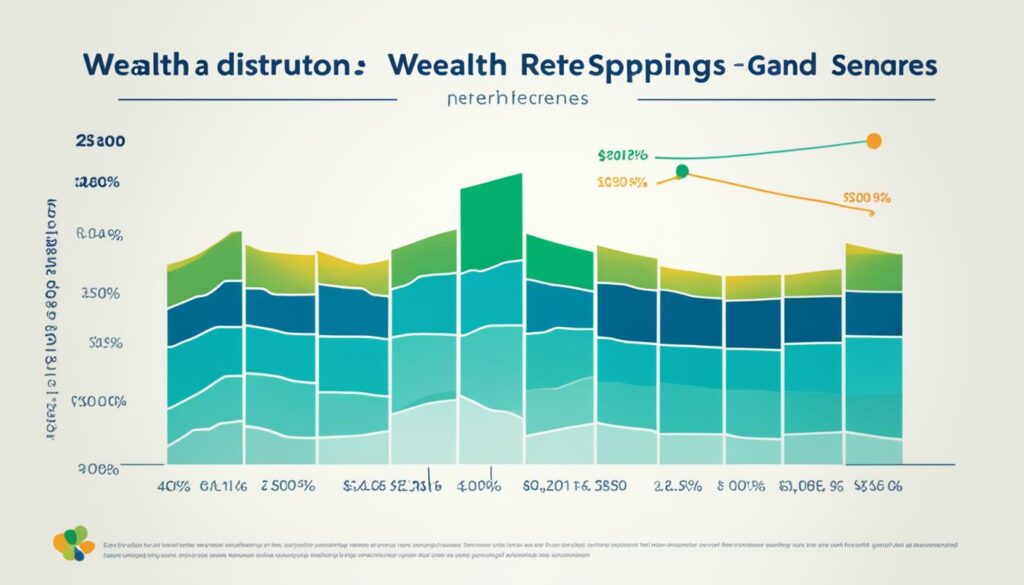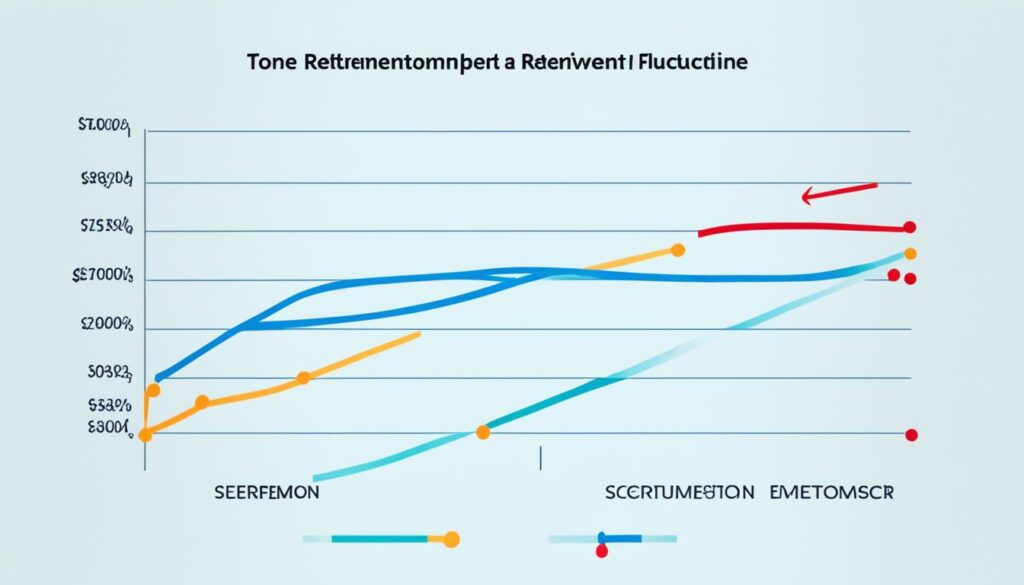After retiring, changing how I spend money is a big challenge. I worked hard to save money and manage it well over the years. Now, I need to shift from saving to using my retirement funds. It’s tough because I’m used to saving, even though I saved a lot.
A BlackRock survey showed that many US retirees face this same struggle. After almost 20 years of retirement, people still had most of their savings. Yet, only a third felt okay about spending it. This shows how hard it is to change our spending habits.
Not fixing our spending habits after we retire can be bad. It could lead to using up our savings too fast or having a lower quality of life. I’m trying to find the right balance. I want to enjoy my retirement and keep my money lasting. I plan to use budgets, manage my debt well, and think about money in a smart way. This should help me get over the fear of spending in my retirement. I want to have a great time in my golden years. To achieve my goals, I am also researching various retirement saving strategies for balance. By educating myself about different investment options and adjusting my withdrawal rate, I can stretch my savings while still enjoying the experiences I’ve always dreamed of. Connecting with financial advisors and other retirees can provide valuable insights, allowing me to navigate this new chapter with confidence and joy.
Key Takeaways
- Adjusting spending habits is a significant challenge for retirees transitioning from a saving mindset to a spending one.
- Many retirees experience anxiety about spending their savings, even when they have accumulated substantial wealth.
- Failing to adapt consumer behavior and lifestyle choices can lead to the rapid depletion of retirement savings and compromised quality of life.
- Embracing budgeting, responsible debt management, and a flexible money mindset can help overcome the psychological hurdles associated with spending in retirement.
- Striking a balance between enjoying retirement and ensuring the longevity of financial resources is crucial for a successful post-retirement life.
The Retirement-Consumption Puzzle
As I near retirement, the drop in spending has me puzzled. When people stop working and retire, they spend less. What’s puzzling is that this drop doesn’t match up with theories. The main theory says people keep their spending steady all their lives.
Spending Declines at Retirement
Studies show a big drop in spending when people retire. It’s not just a small change, but a major shift. Take a look at this data:
| Country | Median Spending Decline at Retirement |
|---|---|
| United States | 17% |
| United Kingdom | 15% |
| Germany | 12% |
| Italy | 14% |
The spending drop is seen everywhere in developed places. It throws into question a big idea in planning for retirement – that spending should be steady. The data makes it clear. People spend less in retirement.
Potential Explanations for the Decline
Researchers have a few ideas why spending goes down at retirement. One reason might be the end of costs tied to work. Think about money spent on traveling to work or buying work clothes. But these costs don’t explain all of the spending drop.

Some might retire earlier than planned because of health or job loss. This can suddenly cut their income and their spending. Also, retirees might enjoy more time at home. They can do things that cost less.
These reasons help us get closer to solving the retirement-spending puzzle. But, there’s more to understand. This question is important for planning and policy about retirement.
“The retirement-consumption puzzle challenges our fundamental assumptions about how individuals allocate resources over their lifetimes. Unraveling this puzzle is crucial for helping people prepare for and navigate the financial challenges of retirement.” – Dr. Sarah Johnson, Professor of Economics at the University of California, Berkeley
I’m dealing with this puzzle in my own plans for retirement. It’s key to be ready for surprises and to be flexible with money strategies. Knowing why spending drops, I can plan better for my later years.
Heterogeneity in Spending Change at Retirement
Retirees don’t spend the same. The change in spending after retirement varies a lot. This change is different for those in different wealth groups. Some people spend more after they retire. But people with less money might spend less after they stop working. We will look at why this happens and why it matters for planning for retirement.
Wealth Quartiles and Spending Patterns
Wealth plays a big role in spending after retirement. Often, those with more money tend to keep spending the same or more. They’ve saved enough during their working years. This helps them live well without cutting back.
Conversely, people with less money might have to spend less after retiring. They had fewer chances to save up. Without enough savings, they need to watch their spending carefully in retirement.

Health Shocks and Early Retirement
Health problems can force early retirement. For some, getting sick or hurt means they have to stop working sooner than they’d planned. This can drop their income and change how much they can spend.
Those without much saved are hit hard by health issues and early retirement. They may find it hard to pay for medical care and daily living costs. This can lead to a big drop in how much they spend in retirement.
Short Planning Horizons
Not getting ready for retirement can be tough. Some people don’t save enough or plan well ahead. They don’t realize how important it is to save over time.
When they retire, they might not have saved up enough. This means they need to cut back on spending. Not planning well for retirement can make spending changes different for everyone in retirement.
| Wealth Quartile | Spending Change at Retirement |
|---|---|
| Top 25% | Likely to maintain or increase spending |
| Bottom 25% | Higher rates of spending declines |
Knowing why people spend differently in retirement helps everyone. It helps those planning retirement, those giving advice, and those making policies. By understanding what causes the differences, like how much people saved and unforeseen health problems, we can make plans that help everyone get ready for retirement.
Addressing the retirement-consumption puzzle requires a multifaceted approach that takes into account the diverse experiences and challenges faced by retirees from different wealth backgrounds.
Promoting financial education and starting retirement planning early is a good start. Also, helping those who face unexpected health issues can ensure a good retirement for all.
The Life-Cycle Model and Consumption Smoothing
The life-cycle model is a key idea in economics. It says people pick how to use their money to be happiest over their lives. This model holds that people think ahead and use money wisely. They plan their spending to match their future needs.
This model suggests we should spend money evenly throughout our lives. This holds true even when big life changes, like retirement, happen. The idea is to keep spending steady to not run out of money later on.
People try to get the most happiness from their money. They balance what they spend now with what they’ll need later. If they plan well, they shouldn’t have to change their spending much over time.

But, many people spend less when they retire. This doesn’t quite match what the model predicts. The retirement-consumption puzzle shows there are more things at play. Loss of income or a change in living cost can change how we spend.
“The retirement-consumption puzzle highlights the need for a more comprehensive understanding of how individuals make financial decisions and adapt to changing circumstances over their lifetimes.”
The life-cycle model helps us understand spending patterns. However, it has limits. Things like knowing how to handle money well and worries about the unknown future can mess with our spending plans.
Strategies to handle retirement should take these extra factors into account. This helps ensure a financially secure and happy retirement for each person.
Challenges in Transitioning from Saving to Spending
When you retire, changing from saving to spending can be hard. You’ve spent years saving money. Now, using that money for retirement makes some people worry. They are scared they’ll run out of money or what their future costs will be.
Psychological Resistance to Drawing Down Savings
Retirees often find it tough to spend their savings. They don’t like seeing their bank accounts shrink. Even if it’s for retirement fun, watching savings go down makes them feel bad. So, they might spend less than they could, missing out on all they saved for.
To get over this fear, changing how you see your savings is key. Your savings are meant to make your retirement secure and fun. Make a plan for how you’ll spend this money and later update that plan. This can help you enjoy your retirement more.
Uncertainty About Life Expectancy and Future Expenses
Some retirees worry a lot about how long their retirement will last and the costs. People live longer now, making retirement last for many years. This and the unknown future costs can be very stressing. It’s hard to tell how much to spend without using up all your savings.
Look into a pension or annuity for a fixed income. This can help with the basics. And, keep an eye on how you spend and adjust as needed. This will help make your savings last as long as you do.
| Retirement Challenge | Potential Solution |
|---|---|
| Psychological resistance to drawing down savings | Reframe perspective on retirement savings and create a comprehensive retirement income plan |
| Uncertainty about life expectancy and future expenses | Incorporate guaranteed income sources and regularly review and adjust spending habits |
Changing from saving to spending in retirement is tough. But, with plan and adjusting, you can do it. Address the worries and make a plan. This way, you can have a great retirement without running out of money.
Strategies for Overcoming the Spending Habits Hurdle
Changing from saving to spending in retirement is hard. But, there are ways to beat this challenge. Start by making a retirement income plan. It should fit with your money situation, dreams, and how much risk you can take. This plan must cover all parts of managing your money. This includes how you spread your money out (asset allocation) and how to pay less tax (tax optimization). These help you use your money well and for a long time.
Talking to a money pro, like a financial advisor, can be very helpful. They can make a plan just for you and give you tips on where to put your money. They can keep helping you as you get used to spending your money in new ways. Working with a retirement coach can also be good. They focus on how you feel about money and spending. This can make you feel better about spending in your retirement.
Gradually Adjusting to a New Spending Mindset
One important way is to slowly start spending in a new way. Make real budgets that let you enjoy life but also keep you safe money-wise. Choose important life experiences over just things. Finding the right balance and thinking about your spending can help ease any worries.
The point of retirement is to live fully and comfortably. It asks for changes in how you think and spend money. By planning well, getting advice, and changing how you think about spending, you can have a great retirement.

